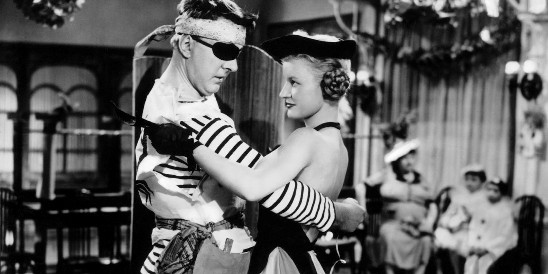 The best introduction to the comedy of Jacques Tati is this 1953 film about an eccentric vacationer, M. Hulot, and his bizarre interactions with other guests at a seaside hotel.
The best introduction to the comedy of Jacques Tati is this 1953 film about an eccentric vacationer, M. Hulot, and his bizarre interactions with other guests at a seaside hotel.
If I had to pick one filmmaker who was probably an alien from outer space, it would be Jacques Tati. In his movies, people are viewed as the most awkward and absurd creatures imaginable, like weird puppets that are made to dance in arcane, goofy social rituals. The humor is drier than dry—you are just as likely to gape with an open mouth and puzzled expression as you are to laugh. I think the best introduction to his work is his second film, from 1953, Monsieur Hulot’s Holiday.
Monsieur Hulot, played by Tati himself, is an overly courteous, middle-aged bachelor who walks with a peculiar half-step, smokes a pipe, and acts decisively even though he has no idea what’s going on. He goes on holiday to the beach in an odd little car that is constantly backfiring, and we follow him as he interacts with the other vacationers at a seaside hotel. There is no plot. The camera just observes the curious behavior of people “enjoying themselves,” often with the accompaniment of an insipid “easy listening” type musical theme.
There are laugh-out-loud moments, as when a collapsible canoe snaps shut over Hulot while he is rowing in it, or when his escaped spare tire gets mistaken for a wreath at a funeral, or the brilliant ending sequence involving a small shed full of fireworks. But more often, Tati simply focuses on little details of daily behavior, with maniacal precision. The exaggerated body language exhibited by the holiday-goers as they play cards, stroll about, or bow to one another in greeting; the punctuating sounds of routine, such as the squeak of the dining room door as it opens and closes (the soundtrack is as full of amusing sound effects as it is almost empty of dialogue); Hulot’s hesitant navigation of the simplest physical actions, such as sitting or taking his hat off; all produce the effect of seeing human interaction divested of customary meaning and invested with the ridiculousness of distance. But never, I should note, with contempt; there is no hatred or anger in Tati’s universe, only a blind, well-intentioned lunge forward to the next challenge.
When Buster Keaton was asked what he thought of Tati he said, “I don’t know what you’d call him. He is just out to be artistic.” This, of course, was not meant as praise. Indeed, Tati violated the time-tested rules of comedy. He deliberately ignored the idea of building up to a gag. In M. Hulot’s Holiday he takes the gags apart, presents set-ups without payoffs, gags without set-ups, deflates the gag before it can build, or does without set-ups or gags altogether, playing with the audience’s expectations that there should be some. I think one needs to be in a certain frame of mind in order to really enjoy the film—relaxed, unconcerned with schedules or appointments, and free for the time being of any rancor or resentment, especially towards oneself. Yes, Tati is something of an acquired taste, but well worth your time.

Kirsten Johnson brings us closer to the acceptance of mortality in a mischievous film that uses stunts and special effects to depict various scenarios...

This one-of-a-kind Soviet film portrays the life of an 18th century Armenian poet not through narrative, but through a succession of brilliant symbolic tableaux....

In his latest and most personal film, Pedro Almodóvar contemplates aging, regret, the need to make films, and life as a gay man in...